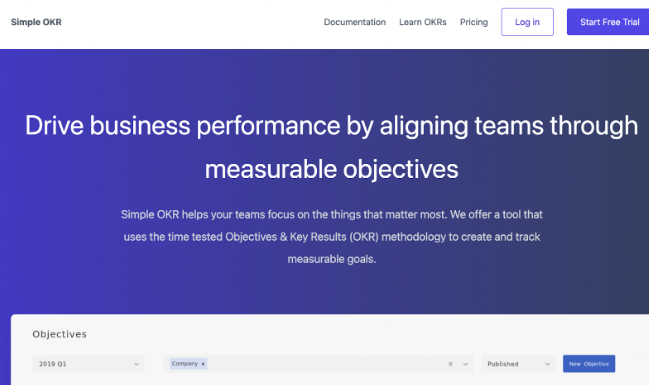When you’re building a startup, every resource counts. Budgets are tight, time is short, and focus is everything. That’s why OKRs (Objectives and Key Results) have become such a powerful tool for early-stage teams.
They bring structure, alignment, and clarity to a fast-moving environment – helping startups grow without losing direction.
But here’s the best part: you don’t need to spend thousands of dollars on software to make OKRs work. In fact, there are several free OKR tools designed specifically to help startups get organized, track goals, and scale smarter.
The Benefits of Free
Free OKR software isn’t just about saving money – it’s about accessibility. For startups, the ability to test-drive a platform without upfront costs means you can:
- Experiment quickly: Find what works before committing.
- Reduce risk: No wasted budget if the tool doesn’t fit.
- Scale at your pace: Many free plans grow with you as your team expands.
- Stay lean: Focus resources on product, hiring, and customer growth instead of software.
With these advantages, free OKR software makes it possible for even the scrappiest of startups to build alignment and momentum.
8 Free OKR Software Startups Love
1. OKRs Tool – Simple, Fast, Startup-Friendly
OKRs Tool was designed with startups in mind, making it one of the most accessible free OKR platforms available. Instead of cluttered dashboards and endless menus, it offers a clean, intuitive interface that keeps teams focused on setting and tracking objectives quickly.
Startups can create OKRs in minutes, run lightweight weekly check-ins, and get a visual overview of progress at any time.
With built-in Slack integrations, teams stay aligned whether working in the same office or across time zones. The free version is generous enough for small teams to build alignment without hitting an immediate paywall.
Why startups love it: Lightweight, intuitive, and affordable. Ideal for small, scaling teams that need clarity without complexity.
2. SimpleOKR – Minimalism That Works
As the name suggests, SimpleOKR takes a no-frills approach to goal-setting.
Startups can set objectives, assign key results, and track weekly progress without needing training or onboarding. Unlike larger enterprise tools that overwhelm users with complex features, SimpleOKR keeps the focus on what matters: alignment and accountability.
The free plan provides enough flexibility for early teams to establish an OKR rhythm without administrative headaches. For founders who want something they can roll out in a single afternoon, this tool is hard to beat.
Why startups love it: Minimal learning curve and fast setup. Perfect for early teams who want to implement OKRs without the complexity.
3. Synergita – OKRs + Performance Engagement
Synergita offers more than just OKR tracking – it integrates feedback, engagement surveys, and performance reviews to create a people-first approach to growth.
For startups trying to balance execution with culture-building, Synergita provides a structured way to align goals while also nurturing team development. The free plan allows small teams to start aligning on OKRs, then layer in feedback and engagement features as they grow.
This makes it a powerful option for founders who believe company culture is just as important as hitting metrics.
Why startups love it: Bridges OKRs with engagement and feedback, making it ideal for startups focused on both growth and culture.
4. Tability – Visual Check-Ins for Busy Teams
Tability is built to make OKR check-ins as painless as possible. Instead of chasing updates in spreadsheets or Slack, startups can use Tability’s guided workflows to track key results with minimal effort.
The platform focuses heavily on visualization, giving teams easy-to-read dashboards that highlight progress, blockers, and upcoming priorities. The free plan works well for small teams who want to introduce structure without adding overhead.
By encouraging lightweight weekly check-ins, Tability helps startups stay aligned without losing speed.
Why startups love it: A user-friendly way to make OKRs part of the workflow, not an extra chore.
5. Weekdone – Habit-Building with OKRs
Weekdone combines OKRs with weekly planning and reflection, making it an excellent tool for startups still learning how to work with structured goals.
Instead of just tracking objectives, it encourages teams to build habits – through weekly reports, coaching prompts, and feedback cycles.
The free plan is tailored for small teams and provides guided templates to help startups adopt OKRs effectively from the start. This makes Weekdone both a tool and a learning platform for new founders.
Why startups love it: Helps startups develop the discipline of OKRs by combining planning, reflection, and alignment.
6. Perdoo – Strategic Alignment at Scale
Perdoo is best known for its strategy mapping features, which help startups connect long-term vision with team-level OKRs. With the free plan, early teams can set goals, track results, and visualize how each objective ties back to the company mission.
As startups grow, Perdoo’s mix of OKRs, KPIs, and roadmap tools make it easy to maintain alignment across functions. Even at the free tier, it delivers a level of structure many small teams struggle to build on their own.
Why startups love it: Brings clarity by showing how every goal ties into the company’s bigger picture.
7. Effy – AI-Driven Feedback + OKRs
Effy blends OKR tracking with automated performance management, making it a strong choice for startups that value feedback loops.
Using AI, Effy helps teams create feedback forms, gather reviews, and send reminders without heavy admin work. This means startups can focus less on managing the process and more on learning from the results.
The free version provides enough to cover small teams, letting founders embed a feedback-driven culture alongside their OKRs from day one.
Why startups love it: Automates reviews and feedback while keeping OKRs simple and actionable.
8. SugarOKR – Free and Focused
SugarOKR is one of the simplest free OKR tools available, built specifically for small teams or solo founders. It removes the clutter of dashboards, advanced reporting, or complex integrations, leaving only what startups need: clear objectives, linked key results, and progress tracking.
This back-to-basics approach makes SugarOKR an excellent replacement for spreadsheets – providing structure without adding complexity.
For early-stage founders with no budget, it’s a clean, risk-free way to introduce OKRs.
Why startups love it: 100% free, distraction-free, and ideal for lean teams wanting to replace spreadsheets.
Conclusion
For startups, focus is everything. The right OKR software keeps your team aligned, accountable, and motivated – without slowing you down. The best part? You don’t need a massive budget to get started.
Whether you’re looking for simplicity (SimpleOKR, SugarOKR), cultural alignment (Primalogik, Synergita), or remote-friendly tools (BOJA, Allo), there’s a free OKR platform that fits your needs.
The key is to start small: set a few objectives, review them regularly, and build the habit of alignment into your team’s DNA. With the right tool, you’ll not only save money – you’ll set your startup up for sustainable growth in 2025 and beyond.



































